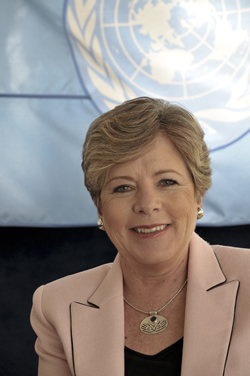"The Progress and Well-Being of the Peoples of the Americas Are a Shared Responsibility"
Work area(s)
Alicia Bárcena participated in the opening of the Sixth Summit of the Americas together with the President of Colombia Juan Manuel Santos and OAS Secretary-General José Miguel Insulza.

(14 April 2012) "Today's challenges transcend national boundaries. Canada, the United States of America and Latin America and the Caribbean share responsibility for the progress and well-being of the peoples of the Americas," said today the Executive Secretary of the Economic Commission for Latin America and the Caribbean (ECLAC) Alicia Bárcena at the opening ceremony of the Sixth Summit of the Americas in Cartagena, Colombia.
At the meeting, which brought together Heads of State and Government of all 34 countries of the American continent and whose motto is "Connecting the Americas: Partners for Prosperity", Bárcena exposed an overview of the economic and social situation in Latin America and the Caribbean and mentioned several policy challenges for moving towards an equal development in the region.
"All stakeholders agree on the value of this hemispheric dialogue between the Americas (of the North, Central and South), as witness the strong attendance by Heads of State and Government here today," highlighted the high-level representative of the United Nations, who conveyed Secretary-General Ban Ki-moon's greetings to the participants in the meeting.
Nonetheless, Bárcena requested that all the countries of the hemisphere be included in the next Summit of the Americas "for this dialogue to gain strength and plan on its continuing in future decades".
The Executive Secretary emphasized the creation of the Community of Latin American and Caribbean States (CELAC) in 2010 "as a historic event of the greatest significance, the objective being to change the way we relate to each other and to the rest of the world in pragmatism and idealism".
"Being partners for prosperity means recognizing that we are equals but respectful of the differences that we perceive in each other; it means recognizing that we have shared but differentiated responsibilities in building this prosperity," she said.
ECLAC integrates the Joint Summit Working Group led by the Organization of American States (OAS). Within this framework, the organization contributed to the meeting in Colombia with technical inputs and proposals that are measurable in time.
"This year marks thirty years since the dramatic debt crisis which plunged our continent into the lost decade of the 1980s. Today, the region is an example of how a severe global recession can be weathered with resilience both economically and socially," she stated.
From her point of view, the region "has learnt to be prudent in the macroeconomic sphere and progressive in the social sphere; applying different countercyclical measures, moderate and short-term as well as structural, and these have enabled us, especially in the past decade, to avoid irreversible social costs."
Bárcena stressed the fact that, due to the States' resolute actions, the region has shown a reduction of people living in poverty form 48.4% (1990) to 30.4% (2011). Extreme or wretched poverty decreased by almost 10 points from 22.6% to 12.8% of the total population, whereas employment increased both in quantity and quality.
The high-level official identified other important factors in the region: controlled inflation (6.6%), solid fiscal policies, a lower and better-structured public debt (under 35% of GDP) and an unprecedented level of international reserves (above US$ 765 billion).
Nevertheless, she also reminded that there are important gaps to close. "Inequality conspires against development and security. Our region can grow more and better. The paradigm today is ensuring equality for growth and growth for equality," Bárcena said.
"Investment levels in the region now stand at 20% of GDP. By contrast, in Asia-Pacific, investments are of the order of 40%," she stressed, and added that "Intraregional trade represents just 19%, compared with as much as 48% in Asia-Pacific and 54% in Europe."
The highest representative of ECLAC also called for rethinking the structure of strategic alliances and giving more important to South-South relationships.
"We can safely say that since 1994, when the first Summit of the Americas was held, not only has the hemisphere changed, but the world is no longer the same. By 2016, the emerging economies, whose weight has been increasing steadily, will account for 53% of world GDP," she claimed.
Among the main topics addressed at the Sixth Summit of the Americas, concluding on Sunday 15 April, are the physical regional integration, the access to and use of information and communication technologies (ICT), natural disasters, security and poverty and inequality reduction.
The previous Summits took place in Miami (1994), Santiago (1998), Quebec (2001), Mar del Plata (2005) and Port of Spain (2009), together with the extraordinary summits in Santa Cruz de la Sierra (1996) and Monterrey (2004).
See also:
- Complete speech by ECLAC Executive Secretary, Alicia Bárcena
- Video of the speech by ECLAC Executive Secretary, Alicia Bárcena, at the Sixth Summit of the Americas (in Spanish)
For further questions, please contact ECLAC's Public Information and Web Services Unit. E-mail: dpisantiago@cepal.org ; Tel.: (56 2) 210 2040.
Follow us on: Twitter, Facebook, Flickr and YouTube.
Country(ies)
- North America
- South America